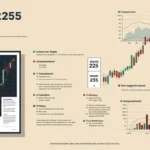The way we read has evolved dramatically with digital platforms. Among these, Ocean of PDF emerged as a recognizable name for free eBook downloads. It offered readers worldwide easy access to thousands of books without paywalls. For students, casual readers, and global audiences, it felt like a library without limits.
However, not all stories are simple. Alongside its popularity, Ocean of PDF faced serious copyright controversies. Its model raised questions about the balance between accessibility and intellectual property rights. Understanding the platform’s journey reveals much about the current challenges in digital reading culture.
What Was Ocean of PDF?
Ocean of PDF started as a free online repository for downloadable eBooks in PDF format. The platform claimed to connect readers to novels, textbooks, and self-help titles at no cost. No subscription was needed. Visitors simply clicked, downloaded, and read.
It quickly attracted attention for its massive catalog. Classic literature stood alongside modern bestsellers. Categories ranged from romance and science fiction to biography and business. Users appreciated the platform’s simple navigation and generous selection.
Why Ocean of PDF Gained Popularity
Accessibility was Ocean of PDF’s biggest strength. Many regions lack affordable bookshops or public libraries. Ocean of PDF offered an instant solution. Students struggling with textbook costs found it invaluable. Casual readers discovered new genres without financial risk.
The simplicity of the platform was another draw. Registration was not mandatory. Search functions were fast and efficient. Unlike many torrent sites, Ocean of PDF had a clean design. Users could find books in seconds and start reading immediately.
The Controversy Surrounding Ocean of PDF
Despite its popularity, Ocean of PDF operated in a grey legal zone. Most books hosted were under copyright. Authors and publishers did not give permission for free distribution. As awareness grew, so did backlash from the writing and publishing community.
Authors spoke out against the platform. Many argued that it hurt their earnings and disrespected their work. Publishers sent legal threats and takedown notices. Although some users defended the platform’s mission of free access, the legal argument remained strong against it.
Temporary Shutdowns and Relaunches
Ocean of PDF faced multiple shutdowns due to legal pressure. Domains were suspended. Web hosts pulled support. However, like many pirate platforms, it often reappeared under new names or slight domain changes.
Each relaunch reignited the debate. Was Ocean of PDF democratizing knowledge or stealing intellectual property? Both sides presented passionate arguments. Yet legally, copyright protection stood firm, pushing the platform further into controversial territory.
Alternatives That Follow Legal Channels
Several platforms offer free or affordable eBooks legally. Project Gutenberg focuses on public domain classics. Open Library loans digital copies legally. Amazon’s Kindle Store provides low-cost and sometimes free promotions for indie authors.
These alternatives protect author rights while expanding access. They show that free or low-cost reading can exist without violating copyrights. Ocean of PDF highlighted demand, but legal channels continue to work toward balance.
The Ethics of Free Digital Access
Supporters of platforms like Ocean of PDF argue that access to knowledge should not be gated by wealth. They see free sharing as a social good. In poorer regions, purchasing a new book can be economically impossible.
However, others argue that authors deserve compensation. Writing is labor. Publishing involves investment. Without financial support, creative industries risk collapse. Ethical debate continues around how to balance these competing values in a digital age.
Impact on Authors and Small Publishers
Independent authors often rely heavily on each sale to sustain their careers. Unauthorized free distribution impacts them harder than large publishing houses. Ocean of PDF, by bypassing official sales channels, sometimes robbed small creators of vital income.
This situation sparked conversations within creative communities. Many writers now use hybrid models—offering some free content while selling premium works. Some even distribute under Creative Commons licenses to control how their works are shared.
User Experiences and Community Stories
Many users share personal stories about discovering new genres through Ocean of PDF. For some, it was a portal to educational resources otherwise unavailable. Students accessed textbooks they could not afford. Book lovers explored authors they later supported through purchases.
However, other users reported issues with broken links, viruses, or inaccurate file formats. As a free and unregulated platform, Ocean of PDF lacked quality control. For every success story, a warning about risks and malware also circulated.
Technology Behind Ocean of PDF
Ocean of PDF operated much like other file-sharing websites. Uploaded files were hosted externally. Links connected users to cloud storage or third-party hosts. The platform itself did not directly host copyrighted files, trying to evade direct liability.
However, this technical setup offered little real protection against takedowns. Authorities and rights holders could easily trace and demand removal. As legal pressure mounted, maintaining the platform became increasingly difficult.
The Broader Context of Digital Piracy
Ocean of PDF was part of a larger conversation about digital piracy. From movies to music to books, the internet has challenged traditional media industries. Consumers expect convenience and affordability. Industries struggle to adapt without losing revenue.
While piracy solutions like Ocean of PDF satisfy immediate demand, they also complicate sustainable publishing models. The tension between instant access and creative rights remains unresolved in many sectors.
Ocean of PDF Today
Today, legitimate versions of Ocean of PDF are harder to find. Many clones and scams use the name to attract traffic. Some fake sites offer dangerous downloads. Users searching for free books must exercise caution to avoid malware and phishing attempts.
Meanwhile, legal platforms continue expanding digital libraries. Subscription services, open access projects, and public domain initiatives offer more legal paths to free reading. Ocean of PDF’s influence lives on by showing how large the hunger for books remains.
The Future of Free Reading Online
Technological innovation may solve the access versus rights dilemma. Blockchain copyright tracking, pay-what-you-want models, and expanded public libraries offer new options. Education on digital ethics can also help readers support creators sustainably.
The lesson from Ocean of PDF is clear. People want stories, knowledge, and connection. Building fair, secure, and inclusive platforms will be crucial to meeting that demand without harming creators.
Frequently Asked Questions
Is Ocean of PDF still active?
Many original versions have been shut down, but clones and imitators still exist online.
Was O-cean of PDF legal?
No, it distributed copyrighted materials without permission, violating intellectual property laws.
Are there safe alternatives for free eBooks?
Yes, Project Gutenberg, Open Library, and Kindle Free Books offer legal and safe access.
Why was O-cean of PDF popular?
It provided free access to a wide range of books, especially valuable in regions with limited resources.
Did O-cean of PDF hurt authors?
Yes, many authors reported lost income and unauthorized distribution of their works.
Can digital piracy be ethical?
The ethics are debated, but legal frameworks support creator rights to earn from their work.
Conclusion
O-cean of PDF reflects the deep desire for accessible knowledge and affordable literature. It made reading possible for many but also challenged laws designed to protect creativity. Its story is not just about piracy or copyright—it’s about how we value words, ideas, and the labor behind them.
As digital culture continues evolving, future solutions must respect both reader needs and creator rights. Platforms that build fairness into access can create a world where stories reach everyone, without harm. O-cean of PDF reminds us that accessibility matters, but so does the human effort behind every page.












